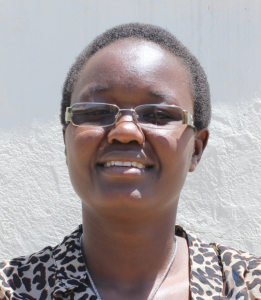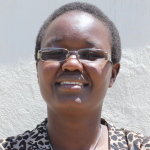The 311 students and 21 teachers at Ivola Secondary School struggle to collect sufficient water each day to meet the water needs of their school.
The rainwater harvesting tanks on the school campus do not serve the school since they are mostly dry due to unfavorable rainy seasons over the past few years in Kenya. So instead, pupils are sent to fetch water from the local spring.

Pupils fetch water from the spring every day, escorted by a teacher, and it is not an easy task. The trek to the spring is steep, and the spring is far from the school.
During the dry season, the spring's yield reduces, and the students queue for hours to get water along with community members who rely on the water source. Some days they return without water, making the trip a waste of time and energy.
No wonder students' classwork and the teachers' ability to facilitate learning are affected with everyone spending so much time collecting water. Even when students are in class, their learning ability diminishes because they are tired and lose concentration.

"I spend a lot of time fetching water, and sometimes I get tired. This has affected my studies a lot because [I] am fetching water a lot more than being in class. Like today, I haven't been in class because we have been fetching water to be used in the kitchen," said 16-year-old Mourine M., shown above at the spring.
All of this effort and still the quality of the water students manage to collect is questionable at best since the spring is open to contamination. But left without another solution, everyone must drink water they know will likely make them ill.
"The water is contaminated, and as a result, I cough a lot. This has forced me to be carrying drinking water from home, which is not easy because sometimes I forget and am forced to drink water in school. This has affected my health because [I] am having persistent coughing. Although currently I am on drugs, I pray that one day, we will have clean water in school," shared 25-year-old teacher Newton Mwanzali (shown below).

Having a borehole at the school will hopefully help students and teachers have enough time in class while still giving everyone access to clean and safe water. The community members around the school will also enjoy clean water since they will be given access to the well during specific times that will not interrupt the school schedule.
What We Can Do:
New Well
We conducted a hydrogeological survey at this school and the results indicated the water table beneath it is an ideal candidate for a borehole well. Due to a borehole well's unique ability to tap into a safe, year-round water column, it will be poised to serve all of the water needs for this school's large population, even through the dry months.
The school will help collect the needed construction materials such as sand, rocks, and water for mixing cement. They will also provide housing and meals for the work team, in addition to providing local laborers. We will complement their materials by providing an expert team of artisans and drilling professionals, tools, hardware, and the hand-pump. Once finished, water from the well will then be used by the school's students and staff for drinking, handwashing, cooking, cleaning, and much more.
Handwashing Stations
The student health club will oversee the two new handwashing stations we will provide, and make sure they are kept clean and in working condition. The club leaders will fill the handwashing stations with water daily and make sure they are always supplied with a cleaning agent such as soap or ash.
VIP Latrines
We will construct two triple-door latrine blocks using local materials that the school will help gather. Three doors will serve the girls and three doors will serve the boys. All of these new latrines will have cement floors that are designed to be easy to use and to clean. And with a borehole right on school property, there should be enough water to keep them clean.
Training on Health, Hygiene, COVID-19, and More
We will hold a one-day intensive training session with students, teachers, and parents. This training will cover a wide range of topics including COVID-19 symptoms, transmission routes, and prevention; personal and environmental hygiene; and the operation and maintenance of the borehole, latrines, and handwashing stations. There will be a special emphasis on handwashing.
Our team of facilitators will use a variety of methods to train, including participatory hygiene and sanitation transformation, and asset-based community development. We will initiate a student health club, which will prepare students to lead other pupils into healthy habits at school and at home. We will also lead lectures, group discussions, and provide illustrative handouts to teach health topics and ways to promote good hygiene practices within the school including handwashing and water treatment. We will then conduct a series of follow-up trainings before transitioning to our regularly scheduled support visits throughout the year.
We and the school strongly believe that all of these components will work together to improve standards at this school, which will help lead to better student academic performance and will help unlock the opportunity for these students to live better, healthier lives.





 Borehole Well and Hand Pump
Borehole Well and Hand Pump
 Rehabilitation Project
Rehabilitation Project

































